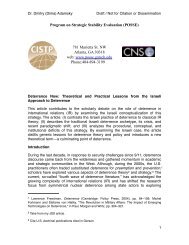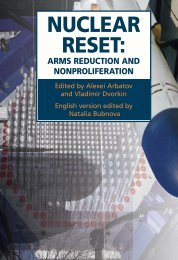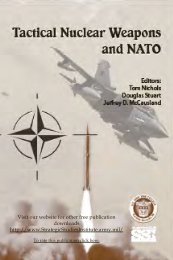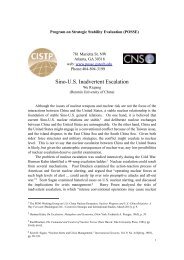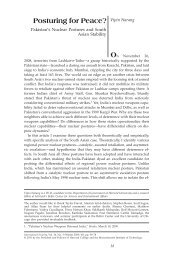Revisiting the Dove's Dilemma: - Program on Strategic Stability ...
Revisiting the Dove's Dilemma: - Program on Strategic Stability ...
Revisiting the Dove's Dilemma: - Program on Strategic Stability ...
You also want an ePaper? Increase the reach of your titles
YUMPU automatically turns print PDFs into web optimized ePapers that Google loves.
Ericks<strong>on</strong> and Way, “Doves <str<strong>on</strong>g>Dilemma</str<strong>on</strong>g>”<br />
legally barred from developing nuclear weap<strong>on</strong>s by internati<strong>on</strong>al treaty law and str<strong>on</strong>g norms<br />
persist against <str<strong>on</strong>g>the</str<strong>on</strong>g> use of nuclear weap<strong>on</strong>s, c<strong>on</strong>venti<strong>on</strong>al weap<strong>on</strong>s present a very different<br />
picture. The right to possess and use c<strong>on</strong>venti<strong>on</strong>al weap<strong>on</strong>s is enshrined in internati<strong>on</strong>al law as a<br />
part of states’ right to self-defense. During <str<strong>on</strong>g>the</str<strong>on</strong>g> Cold War and often since, states have defended<br />
<str<strong>on</strong>g>the</str<strong>on</strong>g>ir right to trade c<strong>on</strong>venti<strong>on</strong>al arms without external interference or scrutiny.<br />
In <str<strong>on</strong>g>the</str<strong>on</strong>g> post-Cold War era, nuclear proliferati<strong>on</strong> remains as significant a c<strong>on</strong>cern as ever,<br />
with new threats associated with <str<strong>on</strong>g>the</str<strong>on</strong>g> possibility of n<strong>on</strong>-state actors like terrorist groups acquiring<br />
nuclear capabilities adding to it. However, <str<strong>on</strong>g>the</str<strong>on</strong>g> situati<strong>on</strong> for c<strong>on</strong>venti<strong>on</strong>al weap<strong>on</strong>s has changed<br />
during this same period, which may account for <str<strong>on</strong>g>the</str<strong>on</strong>g> changes we find in <str<strong>on</strong>g>the</str<strong>on</strong>g> relati<strong>on</strong>ship between<br />
nuclear weap<strong>on</strong>s development and c<strong>on</strong>venti<strong>on</strong>al arms access. Since <str<strong>on</strong>g>the</str<strong>on</strong>g> mid-1990s, internati<strong>on</strong>al<br />
rules and norms have for <str<strong>on</strong>g>the</str<strong>on</strong>g> first time emerged and spread related to <str<strong>on</strong>g>the</str<strong>on</strong>g> restricti<strong>on</strong> of<br />
c<strong>on</strong>venti<strong>on</strong>al arms transfers to c<strong>on</strong>flict z<strong>on</strong>es and unstable regi<strong>on</strong>s in particular (Ericks<strong>on</strong> 2009).<br />
As a result, major supplier states may have become less willing to exploit importer demand for<br />
c<strong>on</strong>venti<strong>on</strong>al arms in some cases. Greater internati<strong>on</strong>al attenti<strong>on</strong> to c<strong>on</strong>venti<strong>on</strong>al weap<strong>on</strong>s in <str<strong>on</strong>g>the</str<strong>on</strong>g><br />
post-Cold War era and <str<strong>on</strong>g>the</str<strong>on</strong>g> resulting multilateral agreements (existing or in <str<strong>on</strong>g>the</str<strong>on</strong>g> works) might<br />
<str<strong>on</strong>g>the</str<strong>on</strong>g>refore mean that resolving <str<strong>on</strong>g>the</str<strong>on</strong>g> dove’s dilemma with a ―buy out‖ strategy has become much<br />
more difficult for many states. Just as <str<strong>on</strong>g>the</str<strong>on</strong>g> internati<strong>on</strong>al community is c<strong>on</strong>fr<strong>on</strong>ting both new and<br />
enduring nuclear security threats, c<strong>on</strong>venti<strong>on</strong>al weap<strong>on</strong>s buy-offs have become a much less<br />
legitimate means to address those threats.<br />
24



